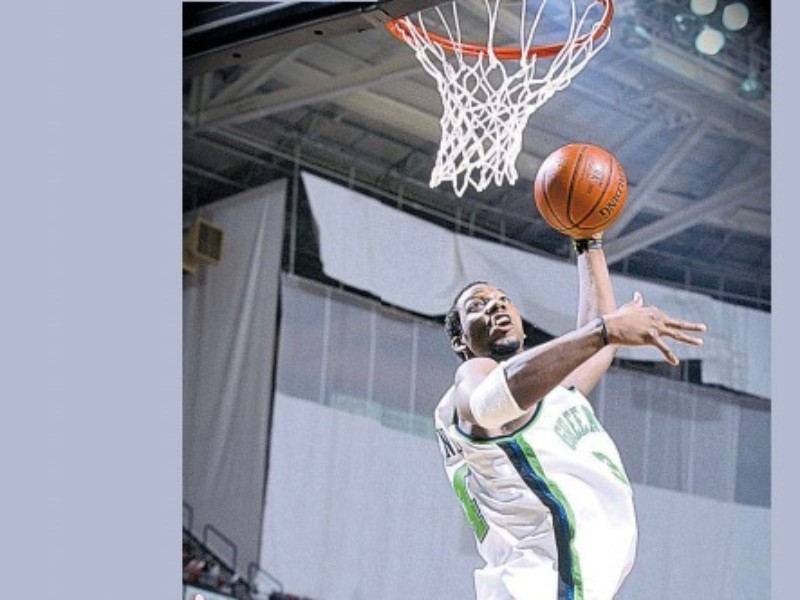
Basketball star loses mansion, luxury cars, but happy for life
BY SEAN A WILLIAMS Assistant Sport Editor
KIMANI Ffriend no longer has the mansion in Atlanta or the luxury cars.
His two years battling a vehicular manslaughter charge in Serbia, which started in November 2012, have taken away a lot materially from the Jamaican basketball star.
But in his own words: “I have also gained a lot” from the Serbian nightmare.
“When you talk about the money, the cars and home, I have lost all of that, but I am not worried about all of that anymore,” he said.
“I just have a little money left.”
Ffriend, 37, said that languishing in a Serbian prison, fighting what seemed a never-ending court battle and then serving time after being found guilty have made him a new man.
“My situation has put a lot of things into perspective, it has really humbled me. I have had a lot of successes in my life, and this is really my testimony to the younger generation and how I have to keep giving God the glory.
“Even though I have lost a lot, I have also gained a lot. I have my life and I am thankful for that, and I see what purpose God has for me. In the beginning, being in jail tells you that you have to live every day to the fullest and you have to be thankful for life. I am talking about one day living the five-star life and having everything, and then in a split second, everything is taken away from you,” Ffriend spoke from a soul in turmoil.
His litigation in the one-year trial came at a big price, where the former Memphis Grizzlies centre was forced to liquidate assets to cover the legal costs.
And it is not over yet. Ffriend’s lawyers have initiated appeal, which should begin shortly.
But until then, Ffriend is serving his time outside of a traditional prison setting and has been placed under house arrest. And for that, he is grateful.
“At the end of the day I have to be thankful… I have every thing, the only restraint is that I cannot go outside. The only places I can go is to visit the doctor or go to court. I have to send a written letter seeking permission from the judge to allow me to go see the doctor, and that’s the only time I can to outside.
“I have a very nice flat that is big. I have the big-screen TV, a pool table, I have the bike to do exercise, I have a long hall that I can run, I have a bar to do pull-ups… I have a bracelet with GPS on my leg, so I am being monitored everywhere I go…if I break the rules or do something that I shouldn’t do according to the terms of my confinement, I can go to jail immediately.” Ffriend explained.
But even with all those home comforts and being able to see people walking by from his window and being able to have visitors, Ffriend still feels like a prisoner.
But after one year under house arrest during the trial, plus his continued confinement there, the former Ardenne High student has recalibrated his life philosophy, which is entrenched in his strong belief in God.
“I am a very spiritual person and my faith is very strong, so I am normally in deep meditation just talking to God and being thankful and just keep focusing on the positive things.
“For me right now, outside just does not exist, I don’t think about outside, I cut myself off from the rest of the world. Yes, I have the Internet, yes I can use the telephone, I can watch movies, but in order for me to make it through each day, I have to put myself in a place where nothing outside exists,” shared the 6-foot, 11-inch basketballer.
Until he is free to leave Serbia and resume his life, time does not exist for Kimani Ffriend.
“I have been doing this so long now that there is no time; for me time does not exist, and I quickly learned in prison that time doesn’t exist. The difference [between] being in jail and house arrest, I have the luxury of communication. In jail, you don’t have that, you are shut off, you can’t communicate with anybody.
“Remember we are talking about Serbia which was a part of the former Yugoslavia which was a socialist country and they are still in that old-time mentality. You cannot communicate with your family nor can they come and visit you… here, because you can watch the TV, read the newspaper, see people walking in the streets, you can get a little restless, but my way of dealing with all of that is not thinking about it,” he noted.
But with God, Ffriend finds peace and comfort in the Almighty’s reassuring arms.
“I always was a religious person; who prayed a lot and allowed God to direct my path; I was always that kind of person. But since my situation, all of that got stronger and I realised that God had a different plan for my life and I got closer to Him,” he said.
There has been a turnaround of his life, too, as he has not had a drink of liquor since the accident, and has vowed that he will never drink again.
He said that solidarity has poured in for him in various forms during his darkest and most difficult hours, and for that he is
eternally grateful.
“I have got a lot of moral support through social media, my friends here in Serbia have been very supportive and because I can’t go outside, they come and bring me what I need.
Ffriend said that from day one the Jamaican consulate in Serbia has been very supportive of him, but at one point he went public to register his disappointment with the response of the Jamaican Government, and the Ministry of Foreign Affiars in particular.
“I had to push the issue as all I wanted was a letter to the ministry here… I was in contact with the (Jamaican) embassy in Berlin and the consulate here and they were helping me, but the problem was communication.
“Initially, I thought I was not getting the support I should be getting as I wasn’t told the full facts of what was happening, so there was a rift between me and the ministry as a result of the article (printed in a Jamaican newspaper)… but everything has been clarified now and we have an understanding and they have been very supportive of me,” Ffriend concluded.





















